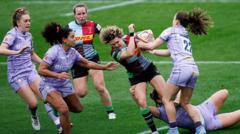Is Fin Smith the Ultimate Choice for England's Fly-Half?

Published: 2025-11-09 14:00:16 | Category: sport
In his latest column, England World Cup winner Matt Dawson argues that Fin Smith is currently England's best fly-half and should be the starter against New Zealand. Dawson highlights Smith's impressive defensive performance and game management during the match against Fiji, noting his ability to make crucial decisions under pressure and contribute significantly to the team's overall strategy.
Last updated: 09 October 2023 (BST)
What’s happening now
As England prepares for a pivotal match against New Zealand, Matt Dawson has voiced strong support for Fin Smith as the starting fly-half. Following a robust display against Fiji where Smith showcased his defensive skills and game management, Dawson believes that Smith’s experience and instincts make him the ideal choice for this high-stakes encounter. The decision from head coach Steve Borthwick is anticipated to be crucial, as it could shape the outcome of the match.
Key takeaways
- Fin Smith's defensive display against Fiji was outstanding and may secure him the starting fly-half position.
- Dawson believes Smith’s decision-making under pressure gives him an edge over George Ford.
- The match against New Zealand is seen as a significant test for both Smith and the overall England team.
Timeline: how we got here
The journey to this pivotal match has seen several key moments:
- September 2023: England wins against Fiji, showcasing strong performances from players, particularly Fin Smith.
- October 2023: England prepares to face New Zealand in the Rugby World Cup quarter-finals, with Dawson advocating for Smith's inclusion in the starting lineup.
What’s new vs what’s known
New today/this week
Dawson's column published this week highlights the growing consensus around Fin Smith’s capabilities, particularly in defence and tactical decision-making. His call for Smith to start against New Zealand comes at a crucial juncture for the England team.
What was already established
Prior to Dawson's comments, there was already recognition of Smith's potential as a fly-half, but his performance against Fiji solidified his case. George Ford had previously led the team, but Dawson argues that Smith's recent form may offer a more dynamic option against a formidable New Zealand side.
Impact for the UK
Consumers and households
The implications of England's performance in the Rugby World Cup resonate beyond the pitch, as public interest in rugby continues to influence local economies, particularly in areas with strong rugby traditions. Successful performances can lead to increased viewership and local support for pubs and restaurants during match days.
Businesses and jobs
Businesses that thrive during major sporting events could see a boost if England progresses further in the tournament. Increased patronage in venues showing matches can create jobs, particularly in hospitality and retail sectors.
Policy and regulation
The Rugby World Cup has prompted discussions regarding sports funding and support for grassroots initiatives in the UK. A successful performance by the national team can lead to increased investment in rugby development programmes, potentially benefiting future generations of players.
Numbers that matter
- 13: Fin Smith has earned 13 caps for England, contributing significantly to the team's performance.
- 9: England's victory over Fiji marks their ninth consecutive win, indicating a strong upward trend in performance.
- 23: Smith is only 23 years old, suggesting a bright future ahead for the young fly-half.
Definitions and jargon buster
- Fly-half: A key position in rugby union, responsible for directing the team's attack and making tactical decisions.
- Caps: Refers to the number of matches a player has played for their national team.
- Game management: The ability of a player to control the pace and strategy of a match.
How to think about the next steps
Near term (0–4 weeks)
In the immediate future, England must focus on solidifying their game plan and player selections as they head into the match against New Zealand. The outcome of this match will be pivotal for both the players' careers and the team's momentum.
Medium term (1–6 months)
Depending on the results of the World Cup, the England team may undergo changes to improve for future competitions. Player development, particularly for young talents like Smith, will be crucial in shaping the squad.
Signals to watch
- Performance metrics from the match against New Zealand.
- Player selections and formations leading up to the quarter-finals.
- Injuries or tactical changes announced by head coach Steve Borthwick.
Practical guidance
Do
- Pay attention to player performance statistics to gauge form and fitness.
- Follow team announcements closely for insights into player selections.
- Engage with local events centred around the World Cup to support community initiatives.
Don’t
- Overlook the impact of player dynamics on team morale and performance.
- Assume that past performances will dictate future outcomes; each match is unique.
- Neglect the importance of tactical shifts during the game that could affect the outcome.
Checklist
- Keep track of player fitness and injury reports.
- Monitor the effectiveness of the team's strategies during matches.
- Stay informed on competitor performance in the tournament.
Risks, caveats, and uncertainties
While Dawson’s analysis presents a compelling case for Fin Smith, the decision ultimately rests with the coaching staff, who must consider various factors including team dynamics, player fitness, and the specific challenges posed by New Zealand. Additionally, the unpredictable nature of knockout rugby can lead to unforeseen outcomes that might alter team selections.
Bottom line
Fin Smith's impressive performances and tactical acumen have positioned him as a strong candidate for the starting fly-half role against New Zealand. His ability to manage the game and defend effectively could provide England with a significant advantage as they aim for success in the World Cup.
FAQs
Why is Fin Smith considered the best fly-half for England?
Fin Smith is considered the best fly-half due to his impressive defensive skills, game management, and ability to make crucial decisions under pressure, as highlighted by Matt Dawson.
What impact does player selection have on England's chances against New Zealand?
Player selection significantly impacts team dynamics and performance, especially in high-stakes matches like against New Zealand, as the right choices can enhance tactical effectiveness and morale.
How can Fin Smith's experience benefit the team moving forward?
Fin Smith's experience, particularly at a young age, allows him to develop his skills further, which can positively influence England's performance in upcoming matches and tournaments.



